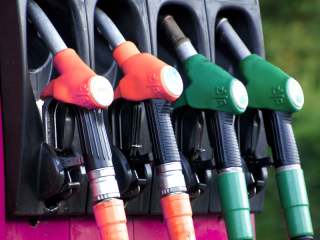
With the ban on new petrol and diesel vehicles fast approaching, businesses need to start considering greener alternatives for their fleets before 2030.
EV technology is currently the most accessible to businesses, as its development has been the primary focus for vehicle manufacturers and Government policies over the last few years. However, electric vehicles are not always the most suitable option for fleets, particularly for larger vehicles such as HGV and specialist construction vehicles.
As there are still barriers that need to be overcome with EVs, we at Right Fuel Card have looked at a range of alternative fuels that could be considered.
In this guide, we’ll analyse the available alternative fuel options and consider how they could benefit businesses looking to reduce their carbon emissions.
EV
Electric vehicles are powered by an electric motor and produce zero emissions whilst driving. This makes them an appealing option for businesses as they can save money on fuel and improve their reputation by having a greener fleet.
There are currently over 450,000 EVs on UK roads and this number is expected to grow substantially over the next few years as more models become available.
With the introduction of clean air zones across the UK, businesses can benefit financially from having electric vehicles in their fleet as drivers won’t have to pay congestion charges. Although they’re more expensive to initially purchase, the servicing and maintenance costs of EVs are cheaper than traditional ICE vehicles, helping businesses to save money in the long run.
However, the technology and infrastructure for electric vehicles are still in need of development as they’re not yet suitable for HGVs or drivers who regularly embark on long journeys.
This is due to their limited driving range, which is usually around 100-300 miles, slow charging capabilities and the fact that public charging points are predominantly located in urban locations, increasing the barrier to switching for rural-based operators.
These limitations are deterring some businesses from making the switch to electric, as trips will take much longer with drivers having more downtime as they wait for their vehicles to recharge.
Nevertheless, electric vehicles will certainly have a significant role in decarbonising fleets that have cars and LCVs, as they’re currently the most accessible fuel alternative. The technology is also being developed so that it can be used effectively by more drivers, even on long-distance journeys.
Advantages of electric vehicles:
No fuel emissions
No road tax or congestion charges
Lower running costs
Disadvantages of electric vehicles:
Slow charging time
Limited driving range
High purchase price
Limited rural access
Hydrogen
Hydrogen is a clean fuel that only emits water vapour from the tailpipe. Unlike EVs, which rely on a battery, the electricity for hydrogen vehicles is generated through a chemical reaction between oxygen and hydrogen in a fuel cell stack. They have a far longer driving range than electric vehicles and can be refuelled in just 5 minutes, making them more suitable for fleets that need to travel nationwide.
Due to these advantages, it’s likely that hydrogen will be the fuel of choice for HGVs as the technology is more practical for larger vehicles than electric ones and will help businesses to reduce the carbon emissions of their fleet.
The biggest challenge with hydrogen power is the lack of infrastructure. Hydrogen filling stations are expensive to build and need to be positioned in relatively isolated locations as hydrogen is highly flammable, making filling stations a potential fire and explosion hazard.
There are currently just 11 hydrogen fuel stations across the UK which is impractical for drivers as they’ll struggle to find locations where they can refuel and so will have to carefully plan their journeys in advance to avoid an expensive breakdown.
However, this network will be expanded in the future as demand for hydrogen vehicles grows, making this technology more accessible for businesses.
Advantages of hydrogen vehicles:
Renewable energy source
Fast refuelling time
Long driving range
Disadvantages of hydrogen vehicles:
Limited selection of vehicles
Lack of charging infrastructure
Expensive to produce and purchase
HVO fuel
HVO (hydrotreated vegetable oil) fuel, is a drop-in diesel alternative which is made by using vegetable oils and animal fats. It can be blended with fossil diesel or used as a complete eco-replacement.
Due to its source material, HVO fuel is regarded as renewable diesel and has a shelf life of up to 10 years, making it a sustainable alternative for businesses that are considering greener fuels for their fleet.
HVO fuel is already being used by large companies such as McDonald’s and has been proven to reduce greenhouse gas emissions by up to 90%. In addition, HVO fuel can be used within existing fleets, equipment and machinery, so appeals to businesses on a budget as they won’t need to invest in new, expensive vehicles.
Although HVO fuel is increasingly being used in the UK as a green source of energy, it does have its limitations. Unless businesses can produce HVO fuel themselves, they’re likely to see an increase in their fuel expenditure as the cost of HVO is currently higher than regular diesel.
There is also limited availability of HVO fuel as it’s not yet being produced on a mass scale, so smaller businesses may not have access to it. However, it’s expected that HVO will become more mainstream fuel in the near future as it’s both practical and beneficial for the environment, so there is significant interest in using it to decarbonise fleets.
Discover our guide to HVO fuel.
Advantages of HVO fuel:
Drop-in fuel so no need to change the current infrastructure or vehicle.
Up to 10-year shelf life
Renewable and sustainable fuel source
Disadvantages of HVO fuel:
Limited availability
More expensive to use than regular diesel
The quality of fuel is inconsistent
Biodiesel
Biodiesel is a renewable fuel source that is made from vegetable oils, animal fats or recycled restaurant grease. Although often confused with HVO fuel, biodiesel contains oxygen and cannot act as a 100% substitution for fossil diesel as nearly all OEMs limit biodiesel content to 20%.
Biodiesel can, however, be used as a transition fuel to help reduce the carbon emissions of businesses that are not yet ready to make the switch to hydrogen or electric.
It’s been reported that using biodiesel instead of regular diesel can reduce greenhouse gases by up to 78%, so although it’s not as efficient as other alternative fuels, using it can still help to protect the environment.
Biodiesel is produced from renewable resources, therefore is available on demand and can be used in any diesel engine, which makes it an easily accessible fuel for businesses. Many industries are already using biodiesel for their vehicles and the demand is growing.
However, it’s important to note that biodiesel can freeze in cold weather, depending on the oil or fat that was used to make it, which can cause issues for drivers using it in winter. There are also some concerns that in some circumstances, biodiesel can cause a slight increase in nitrogen oxide emissions, adding to the risk of acid rain.
Advantages of biodiesel:
Can be used in existing diesel engines
Reduces greenhouse gas emissions
Produced from renewable resources
Disadvantages of biodiesel:
Not suitable for use in low temperatures
Expensive to use
Increases nitrogen oxide emissions
There are now more options than ever before for businesses that are looking for greener options for their fleet. However, it’s important to do research before making the switch from petrol and diesel as each alternative fuel has its pros and cons and some may not be suitable for your fleet.
Ultimately, the best option for your fleet will depend on the vehicles that are used, your budget and the nature of your business. You may even find that it’s more practical to have different vehicles using different fuels.
Regardless of which of these fuels you choose to use, you’ll be helping to reduce your carbon emissions and preparing your fleet for the upcoming ban on the sale of new petrol and diesel vehicles, benefiting your business in the long run.
As businesses will be using a range of different fuels in the future, we’re looking to introduce a wider selection of fuel cards that can be used by a variety of vehicles. We’ve recently introduced an EV alternative to help ease the transition to electric. Apply for the BP Fuel and Charge card or the Shell Fuel and EV card online.
In the meantime, our extensive range of petrol and diesel fuel cards can save your business time and money. Contact our friendly team who are on hand to discuss your options, or you can use our comparison tool to discover which fuel card we’d recommend for your business.




